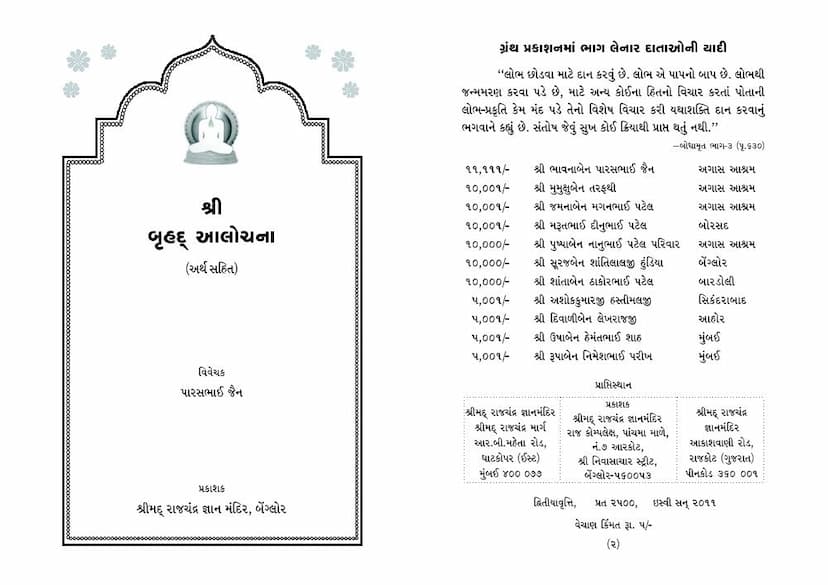Alochana
Added to library: September 1, 2025

Summary
Here is a comprehensive summary of the provided Jain text, "Alochana" by Paras Jain, based on the scanned pages:
Book Title: Brihad Alochana (meaning "Great Exposition" or "Detailed Confession") Author: Paras Jain Publisher: Shrimad Rajchandra Ashram
Overview:
"Brihad Alochana" is a Jain text that delves into the concept of Alochana, which translates to confession, repentance, and introspection regarding past wrongdoings. The book is presented as a commentary and elaboration on the principles of repentance and self-purification within Jainism, drawing heavily from the teachings of Shrimad Rajchandra and other revered Jain saints. The central theme is the earnest plea of a seeker (the author or the voice of the text) to the divine for forgiveness and guidance on the path to spiritual liberation.
Key Themes and Content:
-
The Nature of Repentance (Alochana): The text emphasizes that Alochana is a crucial spiritual practice. It involves bringing past mistakes, faults, and sins to remembrance, confessing them with genuine remorse before a spiritual authority (represented by the divine presence or a spiritual teacher), and resolving not to repeat them. This process purifies the soul from the burden of karma.
-
The Teachings of Shrimad Rajchandra: The book is deeply influenced by Shrimad Rajchandra, whose verses and philosophy are frequently referenced and explained. Shrimad Rajchandra's emphasis on self-realization, detachment from worldly possessions, and adherence to Jain principles like non-violence (Ahimsa), truthfulness (Satya), non-stealing (Asteya), chastity (Brahmacharya), and non-possession (Aparigraha) are woven throughout the text.
-
Confession of Spiritual Ignorance and Misdeeds: The core of the Alochana section involves the author, as a spiritual seeker, confessing various failings:
- Forgetting the True Self: The primary confession is the forgetting of one's pure, eternal soul (Atman) and identifying with the body, family, and worldly possessions.
- Neglecting Divine Teachings: The author admits to not paying heed to the invaluable words of the Lord (the Tirthankaras or the divine essence).
- Failure to Understand Principles: There's a confession of not deeply contemplating the fundamental Jain principles (like the seven tattvas – soul, non-soul, influx, bondage, stoppage, shedding, and liberation).
- Abandoning Virtues: The text laments the abandonment of virtues like compassion, peace, forgiveness, and purity, and instead engaging in vices like violence, anger, pride, deceit, and greed.
- Attachment to Worldly Pleasures: The author confesses being engrossed in the five senses and their objects, leading to a state of delusion and aimlessness.
- Ignorance of Purity: The true nature of the soul as pure consciousness is recognized, but its recognition has been overshadowed by ignorance and attachment to karma.
- Loss of Self-Worth: Forgetting the inherent glory and potential of the soul leads to immense suffering.
- Influence of Ignorance and Vice: The text describes the state of being overwhelmed by vice, ignorance, and attachments, leading to a downfall.
- Absence of True Devotion: The lack of genuine devotion (Bhakti) is acknowledged as a reason for the absence of discernment (Vivek).
- Desire for Salvation: The ultimate desire expressed is for liberation (Moksha) and the attainment of right faith (Samyakdarshan).
-
The Path to Liberation: The text outlines the path to overcoming these failings and achieving liberation:
- Seeking Refuge: Taking refuge in the true Dev (Arhat), Guru (Nirgrantha), and Dharma (Ahimsa-based, adherence to soul's nature).
- Seeking Forgiveness: Asking for forgiveness for all past sins and offenses.
- Developing Right Faith (Samyakdarshan): The aspiration is to achieve unwavering faith in the true principles.
- Repentance and Insight: Deep introspection and sincere repentance for past actions.
- Understanding the True Nature of Reality: Recognizing the soul (Jiva) and matter (Pudgala) as distinct entities.
- Adherence to Principles: Practicing virtues like self-control, non-violence, and detachment.
- The Importance of Knowledge and Renunciation: The text stresses that true knowledge (Jnana) and renunciation (Vairagya) are essential to break free from karmic bondage.
- The Role of Ascetic Practices: Practices like fasting, austerity, and meditation (Tapas) are highlighted as means to shed karma.
- The Power of Devotion: Devotion to the Tirthankaras, the Guru, and the true Dharma is seen as a path to purification and spiritual progress.
- The Concept of Karma: The inevitability of experiencing the fruits of one's actions (karma) is acknowledged, along with the means to mitigate their effects through repentance and virtuous living.
- The Goal of Moksha: The ultimate aim is the attainment of the pure, blissful state of the soul, free from the cycle of birth and death.
-
Structure and Style:
- The text includes verses (often in Gujarati, with translations and explanations).
- It begins with acknowledgments to donors, reflecting its publication by Shrimad Rajchandra Ashram.
- It features an index and a preface explaining the purpose and origin of the book, which started as spoken expositions.
- The language is devotional and deeply reflective, expressing profound regret and yearning for spiritual attainment.
- The text includes detailed explanations of concepts like the five senses, the causes of suffering, the importance of virtuous conduct, and the nature of the soul.
Overall Message:
"Brihad Alochana" serves as a guide and an inspiration for spiritual seekers within the Jain tradition. It underscores the importance of self-awareness, acknowledging one's shortcomings, and actively engaging in practices that lead to purification and ultimate liberation. By confessing faults and dedicating oneself to the path of righteousness as taught by the Tirthankaras and amplified by saints like Shrimad Rajchandra, one can overcome ignorance and attachment, break free from the cycle of karma, and realize the true, blissful nature of the soul.